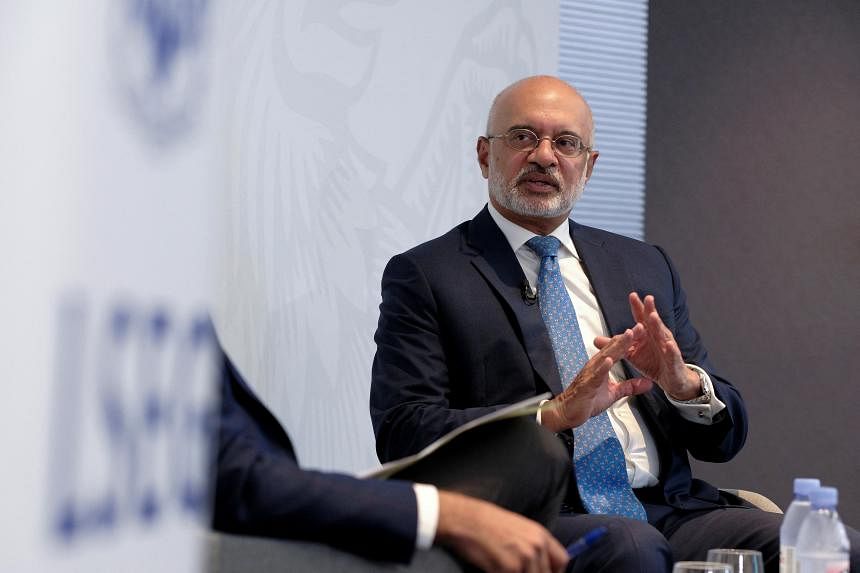SINGAPORE – Singapore’s anti-money-laundering regime is sound, with banks having invested heavily in anti-fraud technology since the global financial crisis, said DBS Group CEO Piyush Gupta, although no system can be 100 per cent foolproof.
“Looking for illicit actors and funds is like finding a needle in a haystack,” he told The Straits Times following a Reuters Newsmaker event on Thursday.
Major banks such as United Overseas Bank, Standard Chartered, Malaysia’s CIMB Bank, Citigroup’s local subsidiary, Deutsche Bank, DBS and the Bank of Singapore have recently been linked to one of Singapore’s largest money-laundering cases involving more than $1.8 billion in assets, including properties, luxury cars and cash.
DBS, for one, has taken a security interest to secure the repayment of a loan to Aiqinhai Investment, whose director and sole shareholder Su Haijin is among the 10 individuals who have been charged in the case.
Property agents, precious metals dealers and golf clubs here have also been drawn into the scandal, raising questions about the guardrails against illicit money flowing into one of the world’s most important financial hubs.
Mr Gupta said banks had already been more cautious over the last 15 years since the global financial crisis. Not only did they invest in anti-fraud technology, but they also leveraged artificial intelligence (AI) to better understand their customers, their backgrounds, sources of funds and wealth, as well as the types of transactions being executed.
“It’s not just the people and technology, but some of the biggest advances in AI in banking are in this space, such as fuzzy logic and network link analysis.”
As banks are expected to be the “global policeman”, technology is used to help check for sanctions, terrorism financing and money laundering.
“But at the same time, we’re moving trillions of dollars and billions of transactions every day. We also file suspicious transaction reports all the time. Less than 1 per cent of the suspicious transaction reports actually result in anything,” said Mr Gupta.
By and large, he added, banks today do a fairly good job and the regulatory rules are very tight. This is why Singapore has a good reputation with the global money-laundering and terrorist financing watchdog, the Financial Action Task Force, and other global institutions.
“If you have a good police force, you should have zero crime in the country, but no country can achieve zero crime.
“It’s not dissimilar in the financial landscape. When we put in all our systems, even at a 99.99 per cent catch, you’ll always find that some stuff goes through.
“I think the good news is that the system was able to pick it up, and the system responded well.”
Too early to tell if banks hit by billion-dollar money laundering case had followed rules, says MAS
Billion-dollar money laundering and the dirty money problem for Singapore
An area banks can “dial up scrutiny on” is in their financing of properties, said Mr Gupta, as real estate is one of the sectors targeted by criminals to “wash” their ill-gotten gains.
On whether the flood of Chinese money flowing into Singapore has distorted the country’s monetary policy by inflating property prices, Mr Gupta said: “It’s somewhat overstated because a large part of the overseas investment has been in the luxury premium segment… but it doesn’t actually impact the mass property market.”
He believes the property market has been driven by “home-grown demand”, such as people seeking to upgrade from public housing to private properties in the million-dollar bracket, and not foreign demand.
Singapore’s move to double property taxes for foreigners signals that policymakers are growing more cognisant of surging money inflows from wealthy Chinese and their spillover effects.
From April 27, foreigners pay 60 per cent tax on any residential property purchase, while the rate for using an entity or trust was raised to 65 per cent to prevent any circumvention of the rules.
Weak link in anti-money laundering efforts is compliance, not family offices: Experts
Properties popular with criminals looking to ‘wash’ dirty money
Touching on China, Mr Gupta said the world’s second-largest economy after the United States is trying to restructure and remodel its economy, and there will be short- to medium-term pain to bear. With a gross domestic product of about US$18.1 trillion (S$24.6 trillion) in 2022, investors should focus on opportunities.
DBS plans to increase its stake in Shenzhen Rural Commercial Bank, which he expects will list on the stock market in the future. DBS bought 13 per cent of the Chinese bank in 2021.
“One of our strengths is we are willing to look through the cycles… If there are headwinds, we slow down,” he said.
Looking at DBS’ investments in the region, Mr Gupta said Taiwan could add up to $1.5 billion to the group revenue next year, while India could add $1.3 billion to $1.5 billion in the next three to five years.
“We have hit an inflexion point in terms of scaling. Some of these markets will start contributing back.”
DBS CEO says China pessimism not ‘overdone’, but upbeat about India
Singapore banks are so flush with deposits that DBS loaned MAS $30 billion
Join ST’s WhatsApp Channel and get the latest news and must-reads.
p.st_telegram_boilerplate:before {
display: inline-block;
content: ” “;
border-radius: 6px;
height: 6px;
width: 6px;
background-color: #12239a;
margin-left: 0px;
margin-right: 13px;
}
a.st_boilerplate {
font-family: “SelaneWebSTForty”, Georgia, “Times New Roman”, Times, serif;
}


